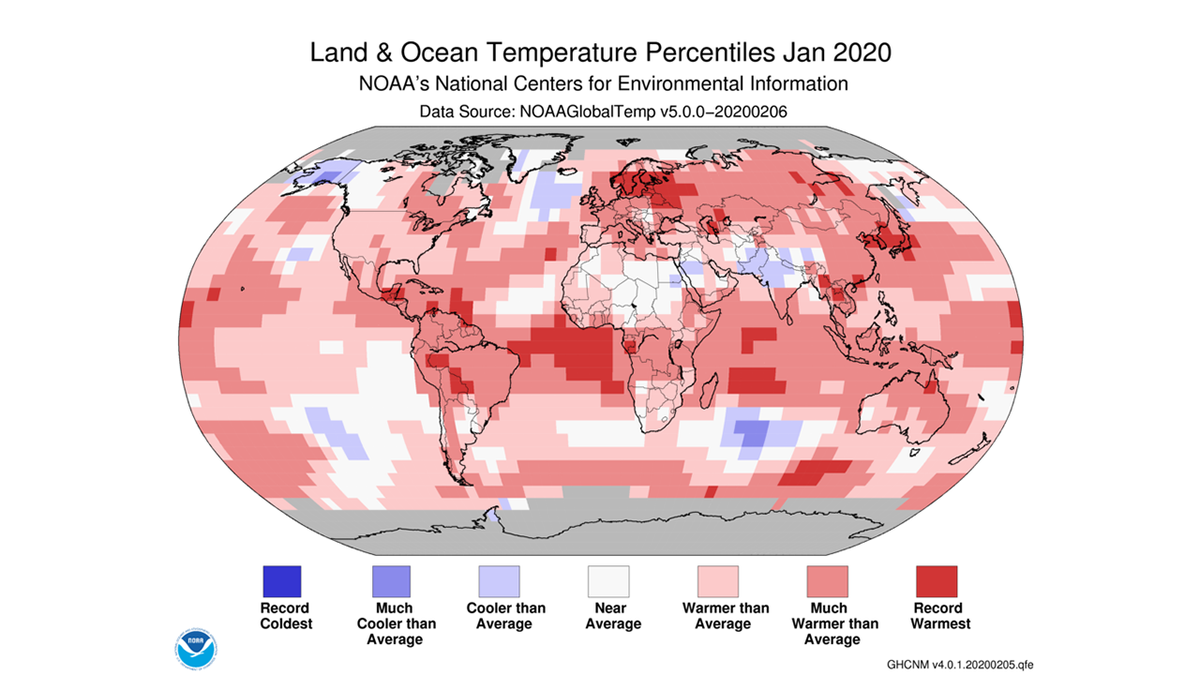United Nations report on oceans show worsening conditions and climate change
A team of more than 100 scientists from 36 countries are raising a red flag on the world’s oceans. The group has authored a report on the risks and threats associated with rising levels and temperatures of Earth’s oceans.
In the 141 years of recorded climate history, no other January has been as warm as last month, according to U.S. government forecasters.
The National Oceanic and Atmospheric Administration said Thursday the average global average land and ocean surface temperature in January was 2.05 degrees Fahrenheit (1.14 degrees Celsius) above the average January temperatures for the 20th century.
"The four warmest Januaries have occurred since 2016; while the 10 warmest Januaries have all occurred since 2002," scientists at NOAA National Centers for Environmental Information noted in their report.
ANTARCTICA TEMPERATURES REACH 69 DEGREES FOR THE FIRST TIME EVER, SCIENTISTS SAY
In parts of Russia, Scandinavia, and eastern Canada, temperatures exceeded the old averages by 9 degrees Fahrenheit as new records were set.
"Lots of regional heat to go around," NOAA noted in its report, adding that no land or ocean areas experienced record-cold temperatures in January.

A man from NOAA's National Centers for Environmental Information showing the scope of warmer-than-average temperatures across the globe in January 2020. (NOAA)
All that warmth meant that snow was also lacking globally.
In the Northern Hemisphere, snow coverage was below the 1981–2010 average, with NOAA observing the 18th-smallest January snow cover in the 54-year record.
'ICE VOLCANOES' ERUPT ON MICHIGAN BEACH DURING ARCTIC BLAST
The extent of Arctic sea ice was also 5.3 percent below the average from 1981-2010, and Antarctic sea ice was 9.8 percent below the average, according to NOAA.

Antarctica experienced its single hottest day ever recorded this month, hitting a high of 69.35 degrees Fahrenheit on Feb. 9, according to Argentine researchers. (AP Photo/Rodrigo Jana)
In a report published in December, government forecasters noted that the Arctic is warming more than twice as fast as the rest of the globe due to the changing climate.
The hottest January coming the second hottest year on record “is one of those indications that things are warming dramatically,” University of Illinois climate scientist Don Wuebbles told The Associated Press.
CLICK HERE FOR MORE WEATHER COVERAGE FROM FOX NEWS
A similar trend appears to be continuing in February for Antarctica.
Last week, temperatures on the continent best known for snow, ice and penguins reached a new record high. On Feb. 9, a temperature of 69.35 degrees was recorded, days after another high of 64.9 degrees. The previous record of 63.5 degrees (17.5 C) was set in March 2015.
Fox News' David Aaro and The Associated Press contributed to this report.









































